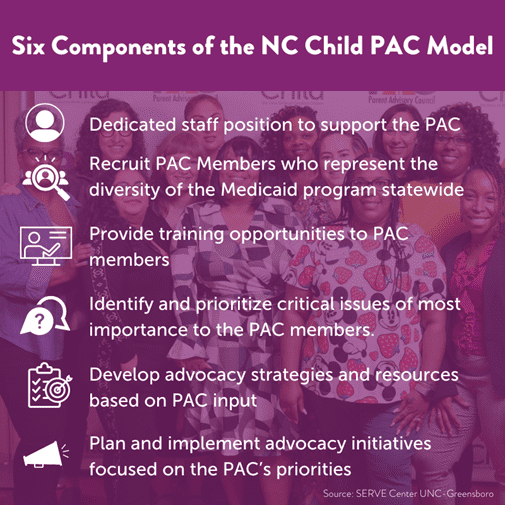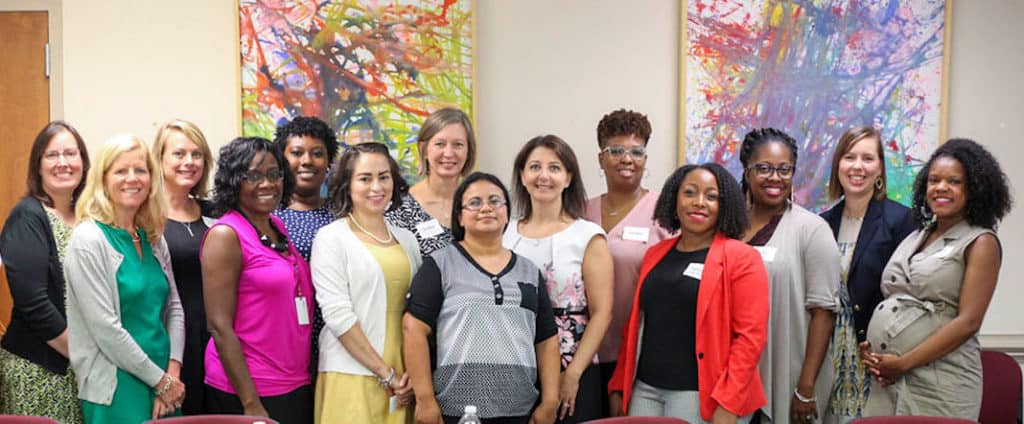“I wanted to help my family and those families in my county. I wanted Medicaid expansion to pass in our legislature. I wanted to have a voice. I wanted to be greater than what I was. I felt being on the PAC would lift me to new levels of advocacy, and it has.”
-PAC Member
Two out of every five children in North Carolina gets access to the health care they need – regular checkups, specialist care, dental and vision care – thanks to Medicaid and NC Health Choice. As NC Child advocates for strong, high-quality Medicaid programs that best serve our kids, we turned to the foremost experts on children’s health: their parents.
We launched the Parent Advisory Council (PAC) in 2018, believing that in order to be the best advocates for kids’ health we could be, we needed parents leading the way. PAC members closely mirror the diversity of North Carolina’s Medicaid population in terms of geography, race, ethnicity, special health care needs, and income level.
“Having strong family advocates to share personal stories helps hit home the advocacy agenda for NC Child.”
-PAC Member
An in-depth evaluation
In 2021-22 we partnered with the SERVE Center at UNC-Greensboro to understand the impact of the PAC on our advocacy work and on the parents themselves. SERVE facilitated an Evaluation Working Group led by two PAC members, Nikia Bye of Trusted Parents and Jenny Hobbs of Advocates for Medically Fragile Children. The evaluation results show a strong advocacy program that can serve as a model for other organizations seeking to pursue an advocacy strategy informed and led by the real experts.
“To make sure that people who utilize Medicaid and those services in the state are informed of changes. And to make sure we have a voice when things are changed and are trying to work toward bettering services for children and also adults within the state.”
-PAC member

How were parents selected to become PAC Members?
A key component of the PAC is the recruitment of PAC members around the state. Kids enroll in Medicaid for different reasons, qualifying for coverage due to income level and/or special health care needs. The PAC members bring those perspectives to the table. We identified prospective PAC members’ backgrounds, and their desire to advocate for kids’ health care, through an application, interview, and selection process. We also used an in-depth orientation process to make sure that new PAC members PAC members got the information they needed, felt highly valued by NC Child, and had a clear understanding of their role.
How has NC Child supported the PAC initiative?
“NC Child has no problem at all understanding how we as the PAC feel, how we want to advocate, and how we want to be heard.”
-PAC Member
Since the PAC began, NC Child has provided various resources to help support the PAC’s mission and goals. The main resources included:
(a) Funding to maintain a dedicated staff position to support the PAC, as well as stipends for PAC members themselves; and
(b) Professional development support to increase the advocacy skills of participating PAC members. We do this through monthly meetings, advocacy trainings on special topics for those interested, and an annual retreat for PAC members.
“But the powerful thing about it is when you have one person speak, sometimes that doesn’t always matter, but when you have a whole Parent Advisory Council speak about something is powerful, and we are not ignored in the state… NC Child builds us up and helps us do any type of advocacy we want to do.”
-PAC member
How are PAC members impacting Medicaid advocacy in North Carolina?
As part of the evaluation, PAC members were asked to rate their experiences identifying and prioritizing critical issues for advocacy. All PAC members agreed with the following statements:
- The PAC is able to identify issues that are most important to PAC members; and
- The PAC is able to prioritize the issues that matter to PAC members so that we can make a plan to advocate together.

PAC members meeting with NC DHHS Secretary Mandy Cohen in 2019
The relationship between NC Child and the members of the PAC is two-way. Each entity informs the other, as a means of ensuring the most effective messaging and advocacy plans. PAC members have been able to learn about and join other health-related advocacy agencies and commissions—and in some cases become part of the leadership teams. A PAC member has also joined NC Child’s Board of Directors, providing even more leadership to the agency. In terms of media coverage, PAC members have been interviewed by news organizations that contacted NC Child to include parent voices in stories about Medicaid and other health-related issues that impact children.
Recommendations for continuous improvement
The SERVE evaluation also provided NC Child with four recommendations to continue strengthening the PAC and its impact on Medicaid advocacy in North Carolina. These include recruiting more dads (fathers, grandfathers, stepfathers and/or foster dads) to serve on the PAC, as well as regularly revisiting the timing of meetings to help remove barriers to participation.
“NC Child listens and understands what is important to children and families in NC which allows them to act quickly when a concern is heard.”
-PAC member
Special thanks to the SERVE Center at UNC-Greensboro, Evaluation Working Group Co-Chairs Nikia Bye and Jenny Hobbs, and working group members Jessica Aguilar, Larinda Battle, Gina Brown, Alicia Jones, and Jereen Wells.


